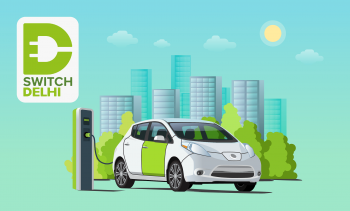
.png) Aarti
Aarti
.png)
At a time when retail prices of petrol and diesel have been rising almost on a daily basis, the recent decision of the Delhi Government to promote the adoption of electric mode is noteworthy.
India imports petroleum products to cover over 80 percent of its transport fuel to power motor vehicles. Two-wheelers which constitutes close to 79 per cent of the total number of vehicles. Three-wheelers (passenger and goods), including tempos are only 4 per cent of the total number of vehicles. Buses and large goods vehicles like trucks account for only 3 percent of the total number of vehicles but many of them contribute considerably to air pollution. Economy and premium four-wheelers constitute 12 percent and 2 percent of the total number of vehicles respectively many of which also contribute to rising pollution levels.
The electric vehicle (EV) policy, announced in December 2019 and notified by the Delhi government in August last year has envisaged that 25 per cent of all new vehicle registrations would be Battery Electric Vehicles (BEVs) by 2024. Primarily, the EV policy focuses on electric two-wheelers, shared transport vehicles (e.g. three-wheelers/buses) and goods carriers/freight vehicles, since they contribute to the majority of the vehicular pollution. At present, electric two-wheelers constitute only 0.2 per cent of annual two-wheeler sales, and electric cars 0.1 per cent of car sales, the sale of electric three-wheelers (autos/goods carriers) are almost zero.
To motivate buyers of EVs, the Delhi government is targeting induction of 35,000 electric two, three, four wheelers and buses along with 1,000 electric vehicles for last mile deliveries and 250 public charging and battery swapping stations.
The EV policy, among others, aims towards reducing air pollution. Besides waiving road tax and registration charges, other incentives on EVs range from a maximum of Rs 30,000 for two and three-wheelers and up to Rs 1,50,000 on the purchase of 4-wheelers. The subsidy would be credited in the bank account of the buyer within three days of the purchase of an electric vehicle.
That over 7,000 new EVs have been so far registered in Delhi and a total subsidy of around Rs 13.5 crore on over 210 approved models has been disbursed as of now depicts people are slowly switching on to zero polluting vehicles. But much needs to done because there are over 109.86 lakh vehicles plying on Delhi roads that includes 32,46,637 four wheelers, 1,13,074 autos and 70,78,428 two wheelers, a phased shift to EVs can cut down vehicular pollution significantly.
If the move of the Delhi government to hire only EVs by its departments within the next 6 months coupled with its policy to replace all end-of-life vehicles powered by fossil fuels EVs is implemented in the right earnest, it would benefit the masses significantly. In terms of savings, as studies indicate, induction of EVs religiously in the next 5 years can cut down oil/natural gas imports which in monetary terms would be to the tune of approximately Rs 6,000 crore. Most importantly, it will curtail avoidable tailpipe emissions to the tune of about 159 tonnes of PM 2.5 (fine particulate matter).
The Government of India had put in place the Faster Adoption and Manufacturing of (Hybrid) Electric Vehicles in India (FAME India) Scheme in March 2015 for a period of 2 years to promote adoption of EVs including electric cars in order to reduce dependency on fossil fuel. Presently, Phase II of the scheme which is under implementation till 2022 with a total budgetary support of Rs. 10,000 crore would mainly focus on supporting electrification of public and shared transportation. Accordingly about 7000 e-Buses, 5 lakh e-3 Wheelers, 55000 e-4 Wheeler Passenger Cars and 10 lakh e-2 Wheelers are to be supported under the FAME India Phase II.
Use of EVs have several advantages as they can largely reduce primary oil consumption in transportation including pollution in cities. Evidently, electric vehicles do not require servicing or change of parts as frequently as diesel and petrol cars. However there is an imperative need to ensure that the key components of EVs, namely the battery and the motor are manufactured to world standards locally so that it can cut down imports and generate employment.
It needs to be appreciated that considering a shift from fossil fuel powered motor vehicles to EVs will not only lead to enormous socio-economic and environmental benefits, but the air will be cleaner and the noise level as well as the oil import bills will drastically come down. With the automobile industry struggling for survival, electric vehicles can change the automobile ecosystem drastically.
Switch Delhi merits emulation.